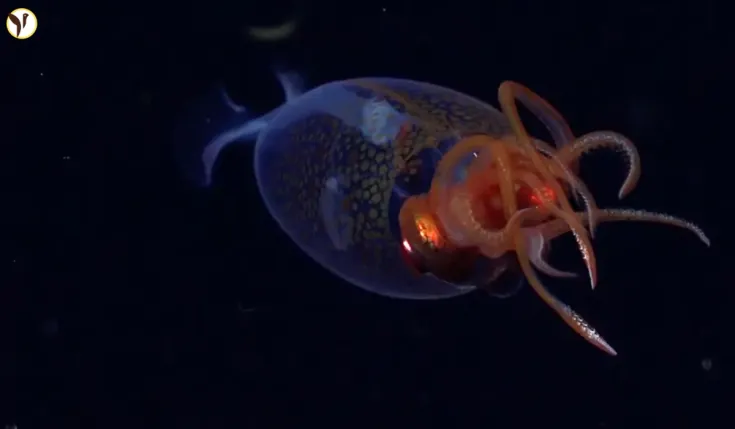Baby Colossal Squid Captured on Video for the First Time in Deep Sea
In a groundbreaking moment for marine science, a team of researchers has recorded the first-ever deep sea footage of a live baby colossal squid — a creature so elusive it has remained mostly a mystery for over a century.
The footage, taken near Antarctica by a remotely operated vehicle named SuBastian, shows the young squid gliding gently through the dark ocean depths, its translucent blue body and orange-speckled arms visible in stunning detail.
A Rare Glimpse into the Unknown
Although giant squids have long captured public imagination through legends and whale encounters, the colossal squid is even larger — and far less understood. It wasn’t officially discovered until about 100 years ago.
Until now, scientists had only seen dead or injured colossal squids brought up accidentally by fishing vessels or found in predator stomachs. But this new footage, recorded at a depth of nearly 2,000 feet below the surface, changes everything.
How Scientists Verified the Discovery
Marine biologists Kat Bolstad and Aaron Evans, experts in deep-sea squids, reviewed the footage and confirmed the sighting. What made the ID clear was the distinctive arm hooks only found on colossal squid.
"When I saw the hooks, I started hyperventilating," Evans admitted during a press briefing. The unique details visible in the footage — such as the reflective eyes and flexible color cells — left no doubt.
A Tiny Squid With Big Features
Despite its small size — just under one foot long — the baby squid already shows signs of what makes its species remarkable:
-
Hooks on arms and tentacles that rotate 360 degrees for grabbing prey
-
Gigantic eyes, possibly the largest in the animal kingdom
-
Color-shifting cells that let it switch between transparent and opaque
Bolstad noted that the creature seemed calm, not alarmed by the approaching camera — likely due to its young age and limited exposure to predators.
Captured During a Deep-Sea Expedition
The squid was spotted on March 9, 2025, during a 35-day expedition led by the Schmidt Ocean Institute as part of the Ocean Census project, which aims to discover and document new marine species.
The remotely operated vehicle SuBastian, launched from the research ship Falkor (too), was exploring waters near the South Sandwich Islands when it made the discovery.
A Delicate Start to a “Monster” Legend
"Eventually, we'll see the adults — large, muscular, and likely intimidating," said Bolstad. "But this time, we’re meeting the colossal squid for the first time not as a monster, but as a beautiful and fragile young animal."
This marks not just a scientific milestone, but a reminder of how much of the deep sea remains unexplored — and how many stories the ocean still holds.






